Company Law: Analysis of Shareholder Rights and Corporate Resolutions
VerifiedAdded on 2020/03/04
|5
|1371
|91
Homework Assignment
AI Summary
This company law assignment analyzes three key issues: the issuance of new preference shares, the division of ordinary shares into different classes, and the issuance of new class B shares to a new investor. The assignment references the Corporations Act 2001 and relevant case law to determine the legality and potential outcomes of each scenario. Part A examines whether Grand Ltd can issue new preference shares on the same terms as existing ones, considering the impact on current shareholders' rights and the need for special resolutions. Part B assesses if ordinary shares can be divided into Class A and Class B, focusing on the variation of rights and the necessity of shareholder consent. Part C evaluates the possibility of issuing incremental class B shares to a new investor at a specific price, considering potential impacts on existing shareholders' rights and the possibility of legal challenges. The analysis emphasizes the importance of shareholder approval, potential legal intervention, and the implications of share structure changes on shareholder rights.
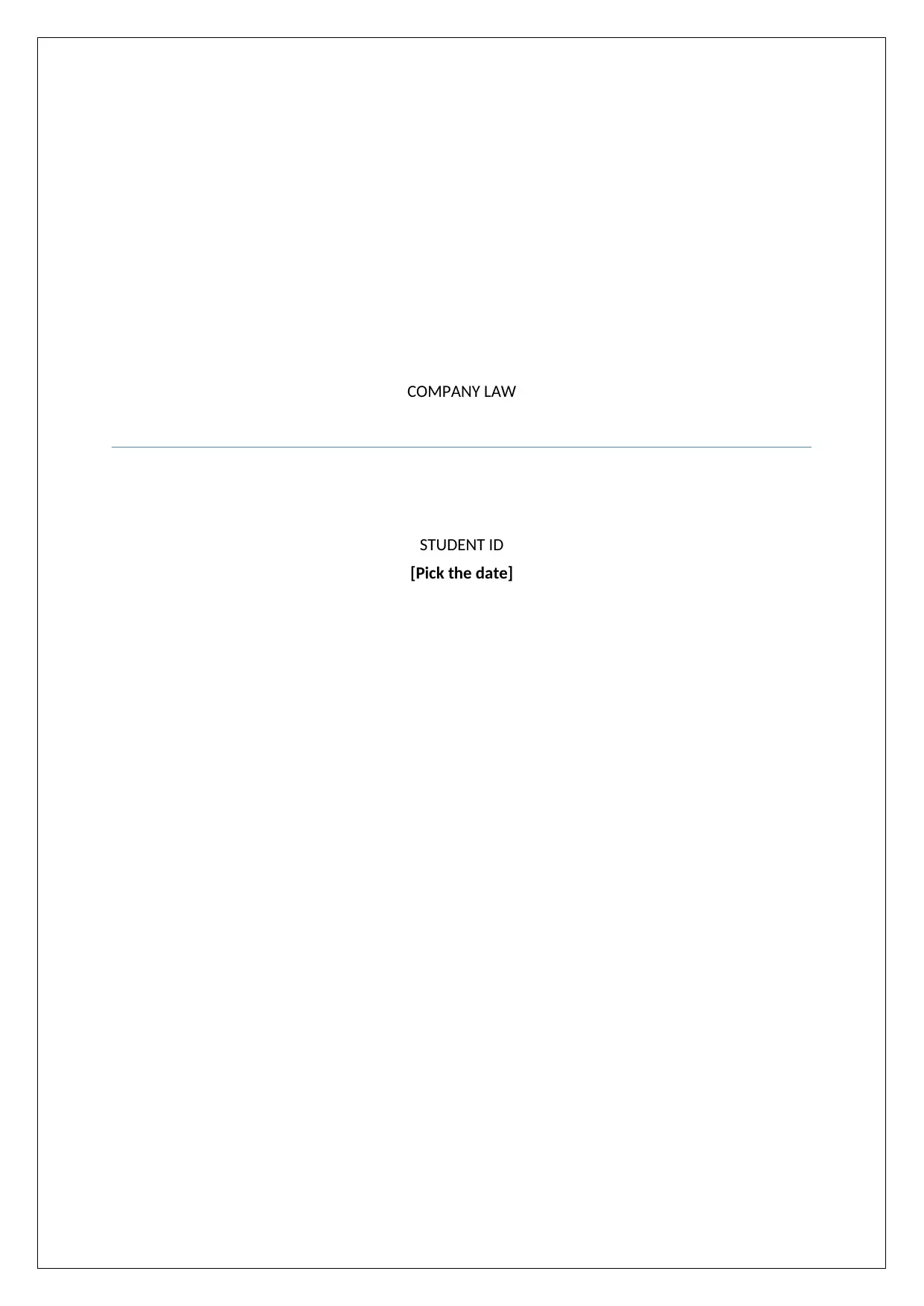
COMPANY LAW
STUDENT ID
[Pick the date]
STUDENT ID
[Pick the date]
Paraphrase This Document
Need a fresh take? Get an instant paraphrase of this document with our AI Paraphraser
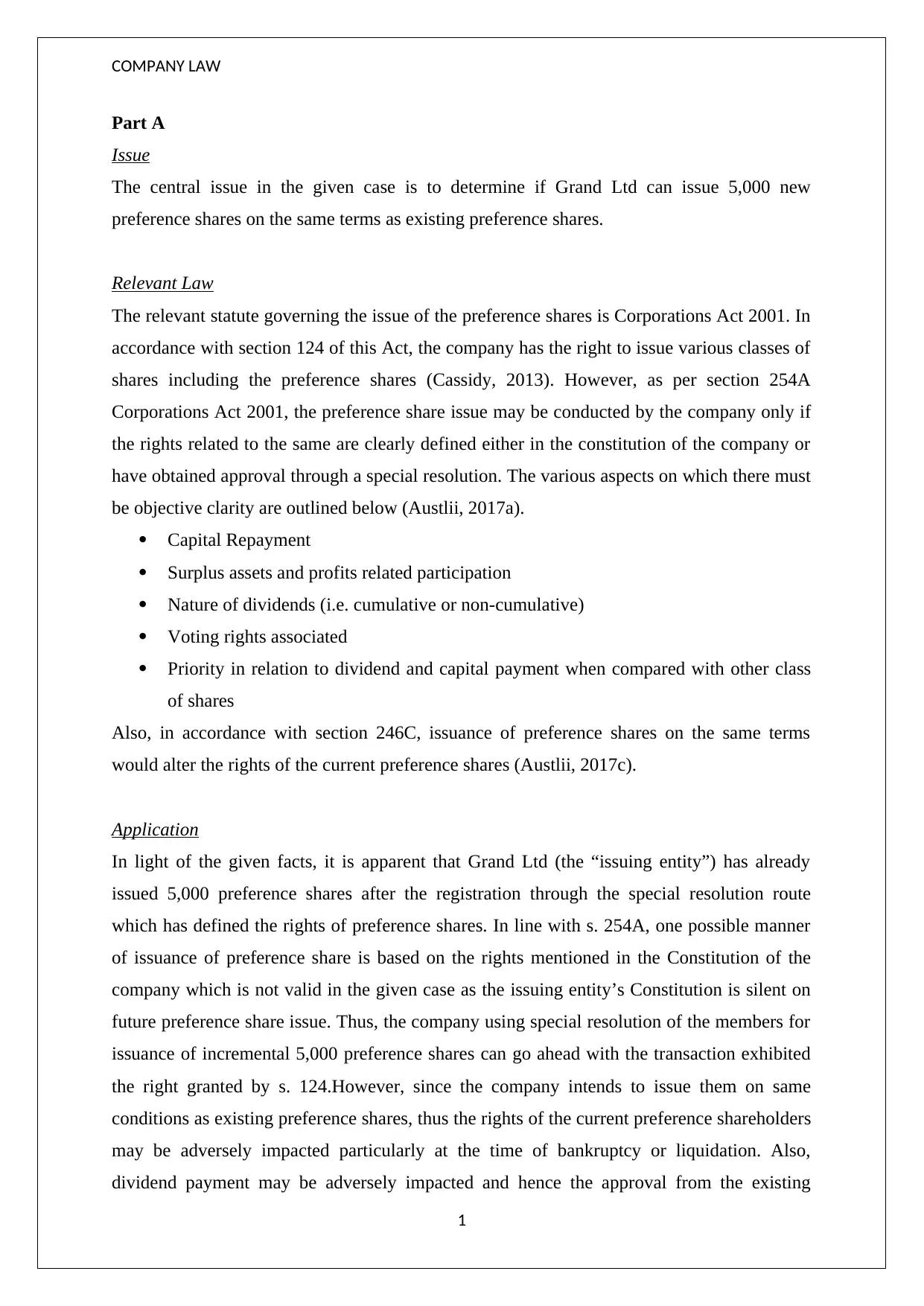
COMPANY LAW
Part A
Issue
The central issue in the given case is to determine if Grand Ltd can issue 5,000 new
preference shares on the same terms as existing preference shares.
Relevant Law
The relevant statute governing the issue of the preference shares is Corporations Act 2001. In
accordance with section 124 of this Act, the company has the right to issue various classes of
shares including the preference shares (Cassidy, 2013). However, as per section 254A
Corporations Act 2001, the preference share issue may be conducted by the company only if
the rights related to the same are clearly defined either in the constitution of the company or
have obtained approval through a special resolution. The various aspects on which there must
be objective clarity are outlined below (Austlii, 2017a).
Capital Repayment
Surplus assets and profits related participation
Nature of dividends (i.e. cumulative or non-cumulative)
Voting rights associated
Priority in relation to dividend and capital payment when compared with other class
of shares
Also, in accordance with section 246C, issuance of preference shares on the same terms
would alter the rights of the current preference shares (Austlii, 2017c).
Application
In light of the given facts, it is apparent that Grand Ltd (the “issuing entity”) has already
issued 5,000 preference shares after the registration through the special resolution route
which has defined the rights of preference shares. In line with s. 254A, one possible manner
of issuance of preference share is based on the rights mentioned in the Constitution of the
company which is not valid in the given case as the issuing entity’s Constitution is silent on
future preference share issue. Thus, the company using special resolution of the members for
issuance of incremental 5,000 preference shares can go ahead with the transaction exhibited
the right granted by s. 124.However, since the company intends to issue them on same
conditions as existing preference shares, thus the rights of the current preference shareholders
may be adversely impacted particularly at the time of bankruptcy or liquidation. Also,
dividend payment may be adversely impacted and hence the approval from the existing
1
Part A
Issue
The central issue in the given case is to determine if Grand Ltd can issue 5,000 new
preference shares on the same terms as existing preference shares.
Relevant Law
The relevant statute governing the issue of the preference shares is Corporations Act 2001. In
accordance with section 124 of this Act, the company has the right to issue various classes of
shares including the preference shares (Cassidy, 2013). However, as per section 254A
Corporations Act 2001, the preference share issue may be conducted by the company only if
the rights related to the same are clearly defined either in the constitution of the company or
have obtained approval through a special resolution. The various aspects on which there must
be objective clarity are outlined below (Austlii, 2017a).
Capital Repayment
Surplus assets and profits related participation
Nature of dividends (i.e. cumulative or non-cumulative)
Voting rights associated
Priority in relation to dividend and capital payment when compared with other class
of shares
Also, in accordance with section 246C, issuance of preference shares on the same terms
would alter the rights of the current preference shares (Austlii, 2017c).
Application
In light of the given facts, it is apparent that Grand Ltd (the “issuing entity”) has already
issued 5,000 preference shares after the registration through the special resolution route
which has defined the rights of preference shares. In line with s. 254A, one possible manner
of issuance of preference share is based on the rights mentioned in the Constitution of the
company which is not valid in the given case as the issuing entity’s Constitution is silent on
future preference share issue. Thus, the company using special resolution of the members for
issuance of incremental 5,000 preference shares can go ahead with the transaction exhibited
the right granted by s. 124.However, since the company intends to issue them on same
conditions as existing preference shares, thus the rights of the current preference shareholders
may be adversely impacted particularly at the time of bankruptcy or liquidation. Also,
dividend payment may be adversely impacted and hence the approval from the existing
1
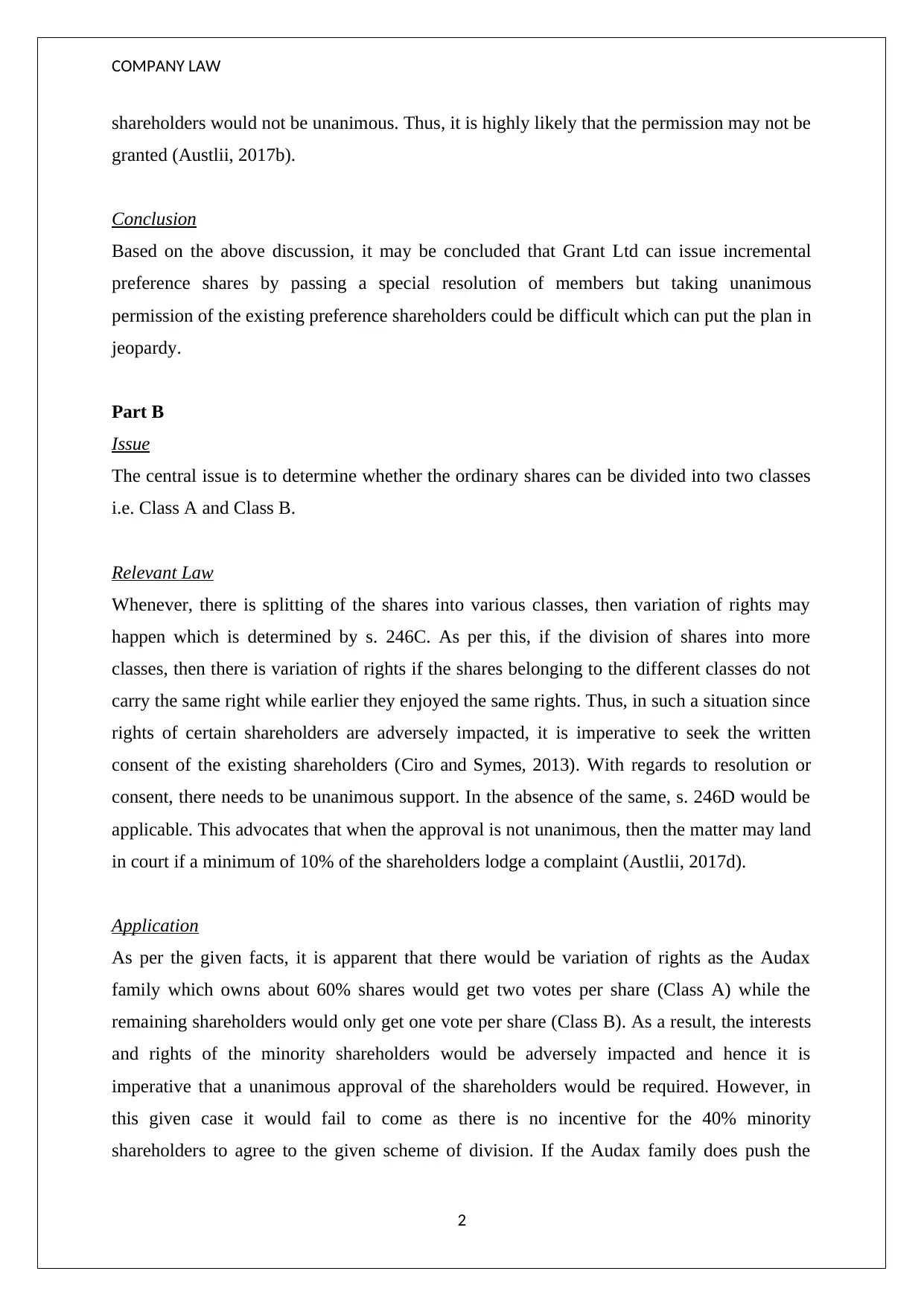
COMPANY LAW
shareholders would not be unanimous. Thus, it is highly likely that the permission may not be
granted (Austlii, 2017b).
Conclusion
Based on the above discussion, it may be concluded that Grant Ltd can issue incremental
preference shares by passing a special resolution of members but taking unanimous
permission of the existing preference shareholders could be difficult which can put the plan in
jeopardy.
Part B
Issue
The central issue is to determine whether the ordinary shares can be divided into two classes
i.e. Class A and Class B.
Relevant Law
Whenever, there is splitting of the shares into various classes, then variation of rights may
happen which is determined by s. 246C. As per this, if the division of shares into more
classes, then there is variation of rights if the shares belonging to the different classes do not
carry the same right while earlier they enjoyed the same rights. Thus, in such a situation since
rights of certain shareholders are adversely impacted, it is imperative to seek the written
consent of the existing shareholders (Ciro and Symes, 2013). With regards to resolution or
consent, there needs to be unanimous support. In the absence of the same, s. 246D would be
applicable. This advocates that when the approval is not unanimous, then the matter may land
in court if a minimum of 10% of the shareholders lodge a complaint (Austlii, 2017d).
Application
As per the given facts, it is apparent that there would be variation of rights as the Audax
family which owns about 60% shares would get two votes per share (Class A) while the
remaining shareholders would only get one vote per share (Class B). As a result, the interests
and rights of the minority shareholders would be adversely impacted and hence it is
imperative that a unanimous approval of the shareholders would be required. However, in
this given case it would fail to come as there is no incentive for the 40% minority
shareholders to agree to the given scheme of division. If the Audax family does push the
2
shareholders would not be unanimous. Thus, it is highly likely that the permission may not be
granted (Austlii, 2017b).
Conclusion
Based on the above discussion, it may be concluded that Grant Ltd can issue incremental
preference shares by passing a special resolution of members but taking unanimous
permission of the existing preference shareholders could be difficult which can put the plan in
jeopardy.
Part B
Issue
The central issue is to determine whether the ordinary shares can be divided into two classes
i.e. Class A and Class B.
Relevant Law
Whenever, there is splitting of the shares into various classes, then variation of rights may
happen which is determined by s. 246C. As per this, if the division of shares into more
classes, then there is variation of rights if the shares belonging to the different classes do not
carry the same right while earlier they enjoyed the same rights. Thus, in such a situation since
rights of certain shareholders are adversely impacted, it is imperative to seek the written
consent of the existing shareholders (Ciro and Symes, 2013). With regards to resolution or
consent, there needs to be unanimous support. In the absence of the same, s. 246D would be
applicable. This advocates that when the approval is not unanimous, then the matter may land
in court if a minimum of 10% of the shareholders lodge a complaint (Austlii, 2017d).
Application
As per the given facts, it is apparent that there would be variation of rights as the Audax
family which owns about 60% shares would get two votes per share (Class A) while the
remaining shareholders would only get one vote per share (Class B). As a result, the interests
and rights of the minority shareholders would be adversely impacted and hence it is
imperative that a unanimous approval of the shareholders would be required. However, in
this given case it would fail to come as there is no incentive for the 40% minority
shareholders to agree to the given scheme of division. If the Audax family does push the
2
⊘ This is a preview!⊘
Do you want full access?
Subscribe today to unlock all pages.

Trusted by 1+ million students worldwide
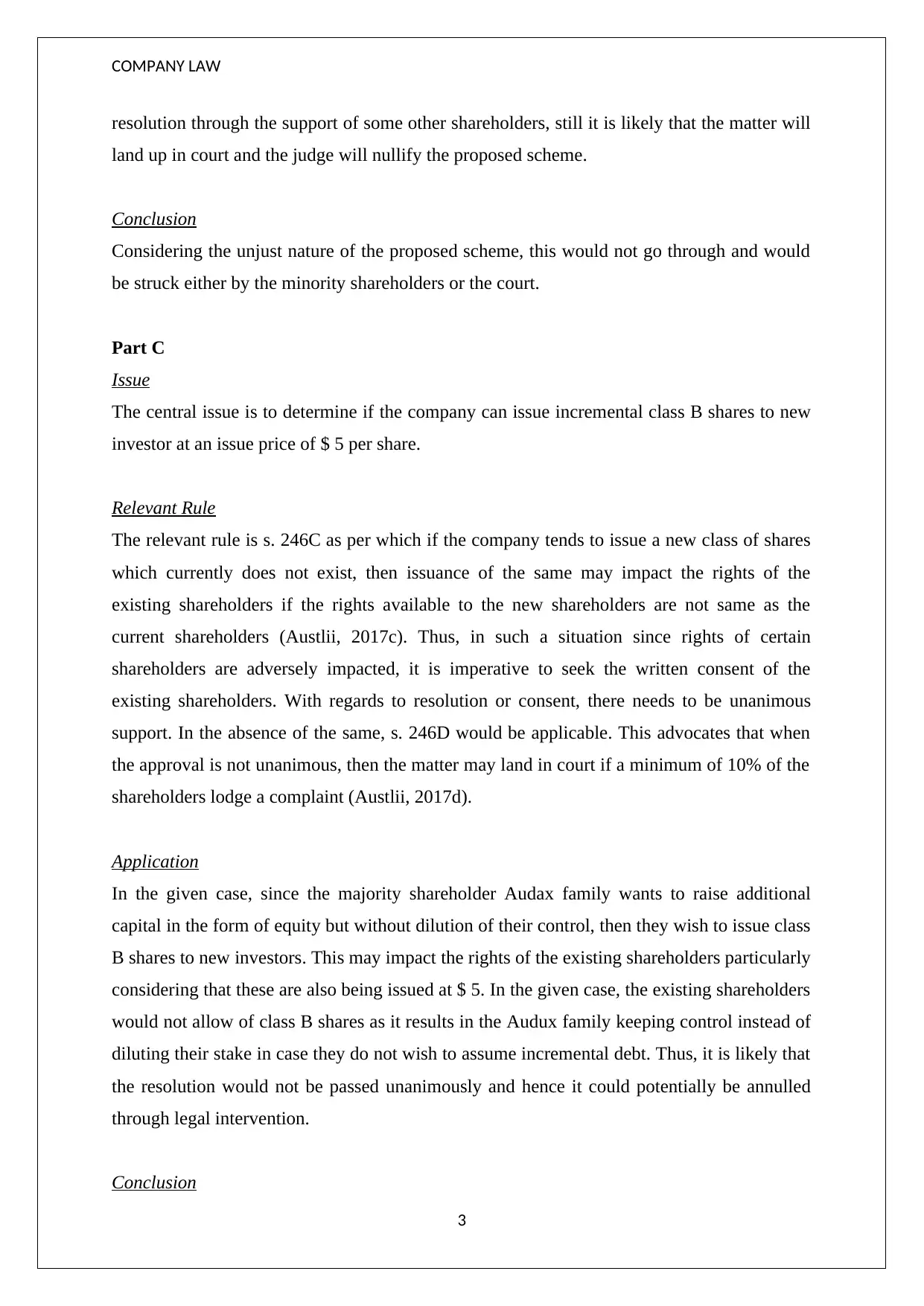
COMPANY LAW
resolution through the support of some other shareholders, still it is likely that the matter will
land up in court and the judge will nullify the proposed scheme.
Conclusion
Considering the unjust nature of the proposed scheme, this would not go through and would
be struck either by the minority shareholders or the court.
Part C
Issue
The central issue is to determine if the company can issue incremental class B shares to new
investor at an issue price of $ 5 per share.
Relevant Rule
The relevant rule is s. 246C as per which if the company tends to issue a new class of shares
which currently does not exist, then issuance of the same may impact the rights of the
existing shareholders if the rights available to the new shareholders are not same as the
current shareholders (Austlii, 2017c). Thus, in such a situation since rights of certain
shareholders are adversely impacted, it is imperative to seek the written consent of the
existing shareholders. With regards to resolution or consent, there needs to be unanimous
support. In the absence of the same, s. 246D would be applicable. This advocates that when
the approval is not unanimous, then the matter may land in court if a minimum of 10% of the
shareholders lodge a complaint (Austlii, 2017d).
Application
In the given case, since the majority shareholder Audax family wants to raise additional
capital in the form of equity but without dilution of their control, then they wish to issue class
B shares to new investors. This may impact the rights of the existing shareholders particularly
considering that these are also being issued at $ 5. In the given case, the existing shareholders
would not allow of class B shares as it results in the Audux family keeping control instead of
diluting their stake in case they do not wish to assume incremental debt. Thus, it is likely that
the resolution would not be passed unanimously and hence it could potentially be annulled
through legal intervention.
Conclusion
3
resolution through the support of some other shareholders, still it is likely that the matter will
land up in court and the judge will nullify the proposed scheme.
Conclusion
Considering the unjust nature of the proposed scheme, this would not go through and would
be struck either by the minority shareholders or the court.
Part C
Issue
The central issue is to determine if the company can issue incremental class B shares to new
investor at an issue price of $ 5 per share.
Relevant Rule
The relevant rule is s. 246C as per which if the company tends to issue a new class of shares
which currently does not exist, then issuance of the same may impact the rights of the
existing shareholders if the rights available to the new shareholders are not same as the
current shareholders (Austlii, 2017c). Thus, in such a situation since rights of certain
shareholders are adversely impacted, it is imperative to seek the written consent of the
existing shareholders. With regards to resolution or consent, there needs to be unanimous
support. In the absence of the same, s. 246D would be applicable. This advocates that when
the approval is not unanimous, then the matter may land in court if a minimum of 10% of the
shareholders lodge a complaint (Austlii, 2017d).
Application
In the given case, since the majority shareholder Audax family wants to raise additional
capital in the form of equity but without dilution of their control, then they wish to issue class
B shares to new investors. This may impact the rights of the existing shareholders particularly
considering that these are also being issued at $ 5. In the given case, the existing shareholders
would not allow of class B shares as it results in the Audux family keeping control instead of
diluting their stake in case they do not wish to assume incremental debt. Thus, it is likely that
the resolution would not be passed unanimously and hence it could potentially be annulled
through legal intervention.
Conclusion
3
Paraphrase This Document
Need a fresh take? Get an instant paraphrase of this document with our AI Paraphraser
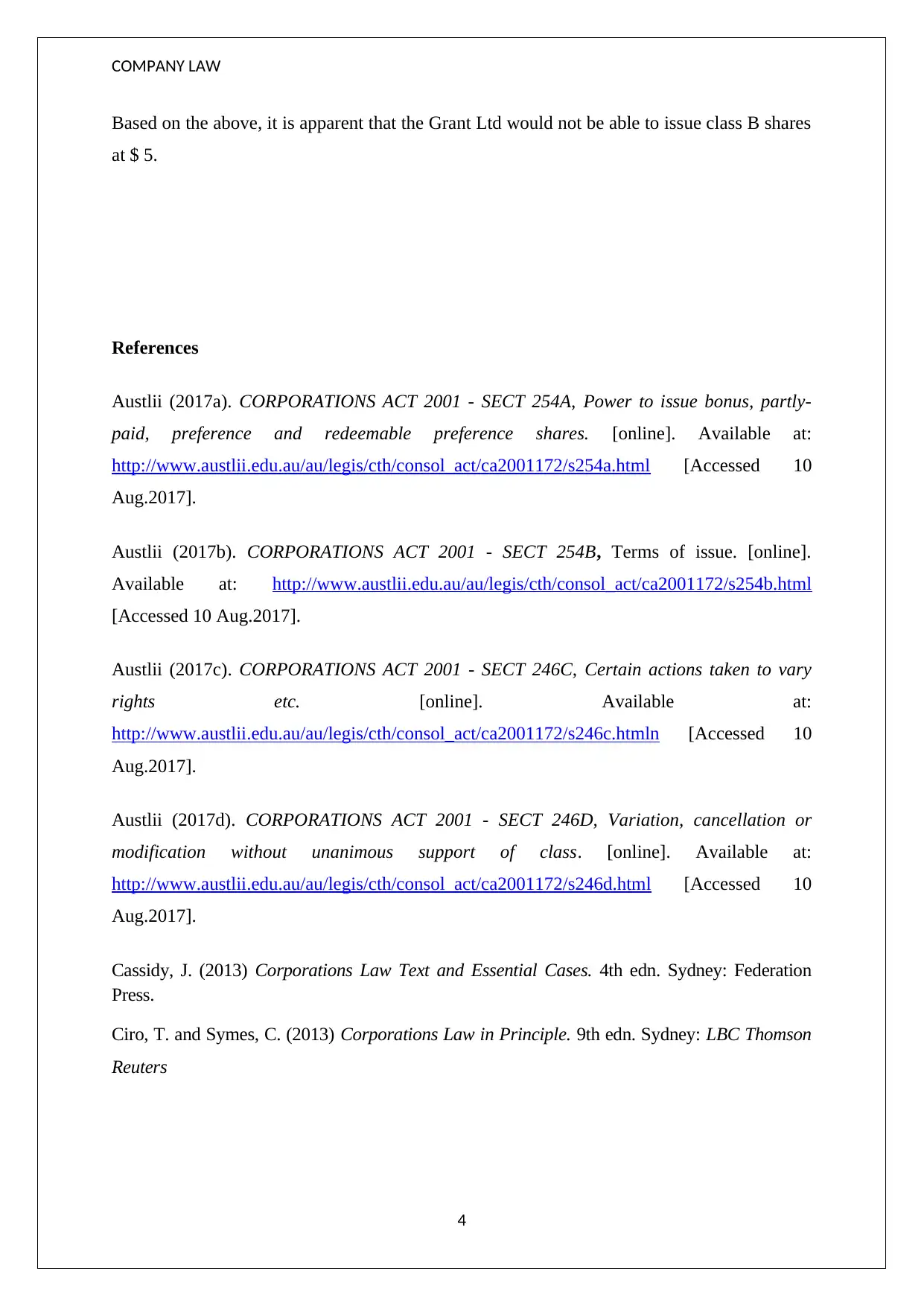
COMPANY LAW
Based on the above, it is apparent that the Grant Ltd would not be able to issue class B shares
at $ 5.
References
Austlii (2017a). CORPORATIONS ACT 2001 - SECT 254A, Power to issue bonus, partly-
paid, preference and redeemable preference shares. [online]. Available at:
http://www.austlii.edu.au/au/legis/cth/consol_act/ca2001172/s254a.html [Accessed 10
Aug.2017].
Austlii (2017b). CORPORATIONS ACT 2001 - SECT 254B, Terms of issue. [online].
Available at: http://www.austlii.edu.au/au/legis/cth/consol_act/ca2001172/s254b.html
[Accessed 10 Aug.2017].
Austlii (2017c). CORPORATIONS ACT 2001 - SECT 246C, Certain actions taken to vary
rights etc. [online]. Available at:
http://www.austlii.edu.au/au/legis/cth/consol_act/ca2001172/s246c.htmln [Accessed 10
Aug.2017].
Austlii (2017d). CORPORATIONS ACT 2001 - SECT 246D, Variation, cancellation or
modification without unanimous support of class. [online]. Available at:
http://www.austlii.edu.au/au/legis/cth/consol_act/ca2001172/s246d.html [Accessed 10
Aug.2017].
Cassidy, J. (2013) Corporations Law Text and Essential Cases. 4th edn. Sydney: Federation
Press.
Ciro, T. and Symes, C. (2013) Corporations Law in Principle. 9th edn. Sydney: LBC Thomson
Reuters
4
Based on the above, it is apparent that the Grant Ltd would not be able to issue class B shares
at $ 5.
References
Austlii (2017a). CORPORATIONS ACT 2001 - SECT 254A, Power to issue bonus, partly-
paid, preference and redeemable preference shares. [online]. Available at:
http://www.austlii.edu.au/au/legis/cth/consol_act/ca2001172/s254a.html [Accessed 10
Aug.2017].
Austlii (2017b). CORPORATIONS ACT 2001 - SECT 254B, Terms of issue. [online].
Available at: http://www.austlii.edu.au/au/legis/cth/consol_act/ca2001172/s254b.html
[Accessed 10 Aug.2017].
Austlii (2017c). CORPORATIONS ACT 2001 - SECT 246C, Certain actions taken to vary
rights etc. [online]. Available at:
http://www.austlii.edu.au/au/legis/cth/consol_act/ca2001172/s246c.htmln [Accessed 10
Aug.2017].
Austlii (2017d). CORPORATIONS ACT 2001 - SECT 246D, Variation, cancellation or
modification without unanimous support of class. [online]. Available at:
http://www.austlii.edu.au/au/legis/cth/consol_act/ca2001172/s246d.html [Accessed 10
Aug.2017].
Cassidy, J. (2013) Corporations Law Text and Essential Cases. 4th edn. Sydney: Federation
Press.
Ciro, T. and Symes, C. (2013) Corporations Law in Principle. 9th edn. Sydney: LBC Thomson
Reuters
4
1 out of 5
Related Documents
Your All-in-One AI-Powered Toolkit for Academic Success.
+13062052269
info@desklib.com
Available 24*7 on WhatsApp / Email
![[object Object]](/_next/static/media/star-bottom.7253800d.svg)
Unlock your academic potential
Copyright © 2020–2026 A2Z Services. All Rights Reserved. Developed and managed by ZUCOL.





